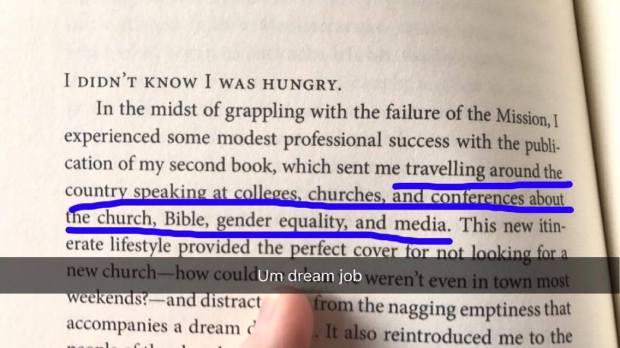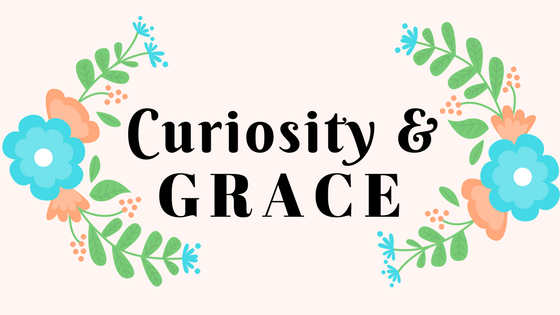Today is the best day of the week and to celebrate, I’m going to talk about one of the books I’m reading right now!
Last year around Christmastime, I read the book “Jesus Feminist” by Sarah Bessey. I’d been wanting to read it for a long time and my (not yet) boyfriend Andrew got it for me for my birthday in October.
As I finally opened the book and delved in a couple months later, I saw that the foreword was written by someone named Rachel Held Evans. I’d never heard of her before, so I did some research and found that she writes about “faith, doubt and life in the Bible Belt.” She’s written three books and often discusses topics like the intersection between faith and feminism, cultural issues, and what it’s like being a doubt-filled believer.
This was quite intriguing to me; after all, “Jesus Feminist” is about the reconciling of Christianity and feminism. I immediately found Evans on Twitter and read through several of her tweets, as well as several of her blog posts.
Many of the things that she was saying were things that I had thought to myself before. “Like it or not, God needs women—for food, for friendship, for the work of redemption.” “If the New Testament household codes mean that patriarchy is a good, God-ordained system for all places and times, then to be consistent, one must also argue that slavery is a good, God-ordained system for all places and times.” “We don’t have to abandon Jesus to abandon the unholy marriage between Donald Trump and the white American Church.”
“Wow,” I thought to myself. “Here is a woman who is speaking to many of the things I’m feeling boldly and unabashedly.” I began to research her books and decided that “Searching for Sunday” was where I would start. It’s not necessarily that I was doubting my faith in God – that’s always been a constant in my life (this isn’t to say that I’ve never doubted – of course I have!). The book just sounded compelling and perhaps even provocative.
With this decision under my belt, I went about my life and almost forgot about the book. It was always in the back of my mind but I was so busy with school and work and life that I never got around to reading it or even purchasing it.
A couple weeks ago, my boyfriend and I were browsing a well-known shop in Denton called Recycled Books. We were looking in the “Religious” section and I suddenly remembered that I’d been wanting to read “Searching for Sunday” so I went looking for it. I found it within minutes and purchased it – I was so excited!
The next weekend I went on a quick trip to Kansas City to visit family and decided that the plane ride would be the perfect time to start reading. From the very first page, I was hooked. Each sentence was written with such authenticity and vulnerability and the experiences she describes in the book are both disparate and familiar to me.

A Snapchat I sent to some friends while reading the book
One of the interesting things about the book is that Evans separates it into sections by the seven sacraments of the Roman Catholic and Orthodox churches, which she lists and describes as follows in her prologue:
- The church tells us we are beloved (baptism).
- The church tells us we are broken (confession).
- The church tells us we are commissioned (holy orders).
- The church feeds us (communion).
- The church welcomes us (confirmation).
- The church anoints us (anointing of the sick).
- The church unites us (marriage).
Within each of these seven sections is a handful of chapters that chronicles Evans’s faith journey through the lens of these sacraments. She says in her prologue that “My aim in employing these seven sacraments is not theological or ecclesiological, but rather literary. They are the tent pegs anchoring my little tabernacle of a story to the ground. I chose them because they have something of a universal quality, for even in churches that are not expressly sacramental, the truths of the sacraments are generally shared.”
She goes on to say that “Of course, the church can also lie, injure, damage, and exclude, and this book explores its dark corners as well as its stained-glass splendors. But for a generation that is struggling to make sense of what church is for, I hope these seven mysteries remind us to “taste and see that the Lord is good” (Psalm 34:8) and to maybe not give up. I hope they remind us of how badly we need one another.”
The prologue alone stood out to me as both poetic and relatable. Why did Evans feel the need to even write this book? She found that she’s often asked to “speak to church leaders about why young adults are leaving the church.” This is a pretty common thread in the church today; new measures are often proposed among online faith communities as to how to retain young church goers and why they’re leaving the church in general.
Evans herself says that she began to grow weary of and frustrated with the church’s (or at least some of the churches she’d attended) exclusivity and refusal to acknowledge or accept certain people. By certain people, I mean those who don’t conform to the traditional white Evangelical mold (at least as society deems these people – after all, gotquestions.org says “In Western culture today, there are many caricatures of evangelical Christians. For some, the term evangelical Christian is equivalent to “right-wing, fundamentalist Republican.”). – i.e., LGBT people, politically liberal people, feminists, etc.
By no means is the church as a whole unaccepting and not every church excludes people based on certain identifying factors. It’s just that Evans and many others have found that those they love and admire are sometimes (or even often) asked not to attend a church because of something about that them that the church doesn’t accept.
I realized that I share many of Evans’s frustrations. When I got to college I was suddenly thrust into an environment quite different than any I’d been in before; UNT is a large school and there are so many different kinds of people – even some that I’d never been around that much before.
The past few years have taught me to be more open to people different than myself and to truly love those around me. I guess you could say that I have the mindset that Christ commands of his people, to “‘Love the Lord your God with all your heart and with all your soul and with all your mind and with all your strength'” and “‘Love your neighbor as yourself.’ There is no commandment greater than these” (Mark 12:30-31).
I know what some of you may be thinking: “But just because God commands us to love our neighbor, it doesn’t mean we have to love their sin.” And I know what you’re talking about. I don’t love anyone else’s sin just as much as I don’t love my own sin. But didn’t Christ tell his followers:
- “Why do you look at the speck of sawdust in your brother’s eye and pay no attention to the plank in your own eye? How can you say to your brother, ‘Let me take the speck out of your eye,’ when all the time there is a plank in your own eye? You hypocrite, first take the plank out of your own eye, and then you will see clearly to remove the speck from your brother’s eye.” (Matthew 7:3-5)
- “The teachers of the law and the Pharisees brought in a woman caught in adultery. They made her stand before the group and said to Jesus, “Teacher, this woman was caught in the act of adultery. In the Law Moses commanded us to stone such women. Now what do you say?” They were using this question as a trap, in order to have a basis for accusing him. But Jesus bent down and started to write on the ground with his finger. When they kept on questioning him, he straightened up and said to them, “Let any of you who is without sin be the first to throw a stone at her.” Again, he stooped down and wrote on the ground. At this, those who heard began to go away one at a time, until only Jesus was left, with the woman still standing there. Jesus straightened up and asked her, “Woman, where are they? Has no one condemned you?” “No one, sir,” she said. “Then neither do I condemn you,” Jesus declared. “Go now and leave your life of sin.” (John 8:3-11)
Again, you might say that Jesus told the woman to “go now and leave your life of sin.” But do not all of us sin every day? We often commit the same sin over and over and over before leaving it behind. The key is the confession and repentance of our sins. Who are we to judge others when we have no place to do so? Christ says, “Do not judge, or you too will be judged…with the measure you use, it will be measured to you” (Matthew 7:1-2).
I feel I’ve gotten off on a tangent, so I’ll get back to the point of this post. “Searching for Sunday” is (so far) an excellent read filled with insightful anecdotes and sprinkled with biblical truths. I encourage anyone struggling with doubt or curious about one woman’s journey through faith to read it! 🙂


Very thoughtful blog entry! You have expressed what I feel many of us are thinking in regard to how Christians should be impartial and love and accept everyone no matter their circumstances, political alliances, ethnic group or any other thing. This mandate comes straight from Jesus! Well said!
LikeLike
Thanks, mom! 🙂
LikeLike
Hello! I nominated you for the Blogger Recognition Award. You can check out the post on my page this Tuesday. Happy writing! -Sarah
LikeLiked by 1 person
Wow, thank you. I really appreciate it! 🙂
LikeLiked by 1 person
But of course!!
LikeLiked by 1 person